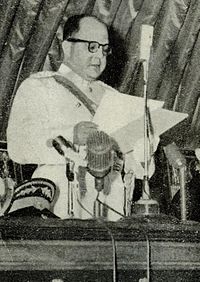Marcos Perez Jimenez
| Marcos Pérez Jiménez | |
|---|---|
 |
|
| President of Venezuela | |
|
In office 19 April 1953 – 23 January 1958 |
|
| Preceded by | Himself as "Provisional President" |
| Succeeded by | Wolfgang Larrazábal |
| Provisional President of Venezuela | |
|
In office 2 December 1952 – 19 April 1953 |
|
| Preceded by | Germán Suárez Flamerich |
| Succeeded by | Himself as "President" proper |
| 30th Commander-in-Chief of the Venezuelan Army | |
|
In office November 1948 – August 1954 |
|
| Preceded by | Carlos Delgado Chalbaud |
| Succeeded by | Hugo Fuentes |
| Minister of Defense | |
|
In office 18 October 1948 – 1 January 1952 |
|
| Preceded by | Carlos Delgado Chalbaud |
| Succeeded by | Jesús M. Castro León |
| Personal details | |
| Born |
Marcos Evangelista Pérez Jiménez 25 April 1914 Táchira, Venezuela |
| Died |
20 September 2001 (aged 87) Alcobendas, Spain |
| Nationality | Venezuelan |
| Spouse(s) | Flor María Chalbaud Cardona |
| Children | 5 daughters |
| Alma mater | Military academy of Venezuela |
| Occupation | Politician |
| Profession | Military officer |
| Religion | Roman Catholic |
| Signature | |
| Military service | |
| Allegiance |
|
| Service/branch | Venezuelan Army |
| Years of service | 1931–1958 |
| Rank |
|
| Battles/wars | none |
Marcos Evangelista Pérez Jiménez (25 April 1914 – 20 September 2001) was a Venezuelan military and general officer of the Army of Venezuela and the President of Venezuela from 1952 to 1958.
His ruling period is characterized by marked improvement in development, with the rise of oil prices facilitating many public works achievements. Political and economic stability, along with the completion of ambitious public works and the rapid development of industries such as hydroelectricity, mining, and steel. He instituted programs to eradicate many of Venezuela's rapidly growing slums, commissioning public housing projects to improve the living conditions of the poor. In addition, he built the Central University of Venezuela, at the time, the largest in Latin America. Pérez Jiménez was also responsible for the modernization of the military and the nation enjoyed a period of high prosperity and social tranquility. On the debit side, however, he presided over one of the most repressive governments in Latin America. His government's National Security (Seguridad Nacional, secret police) was extremely repressive against critics who tried to overthrew him by planting bombs against him and ruthlessly hunted down and imprisoned those who opposed his rule.
Following massive public demonstrations in support for a democratic reform to take place in the government, Perez was deposed in a coup perpetrated by disgruntled sectors within the Armed Forces of Venezuela on 23 January 1958. Perez was then exiled to Dominican Republic, later Miami, United States and afterwards went on to settle in Spain under the Franco regime's protection.
Marcos Evangelista Pérez Jiménez was born in Michelena, Táchira State. His father, Juan Pérez Bustamante, was a farmer; his mother, Adela Jiménez, a schoolteacher. Pérez Jiménez attended school in his home town and in Colombia, and in 1934, he graduated from the Military academy of Venezuela, at the top of his class. He subsequently studied at Chorrillos Military School in Peru.
...
Wikipedia
